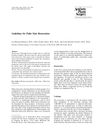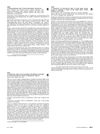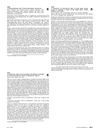 33 citations,
January 2018 in “The Journal of Clinical Endocrinology & Metabolism”
33 citations,
January 2018 in “The Journal of Clinical Endocrinology & Metabolism” Metformin improves menstrual cycles and hormone levels in women with PCOS, mostly within the first 6 months.
 January 2025 in “Indian Journal of Dermatology”
January 2025 in “Indian Journal of Dermatology” Frontal fibrosing alopecia is a challenging hair loss condition with no known cause or definitive treatment.
 9 citations,
January 2022 in “Reproductive Biology and Endocrinology”
9 citations,
January 2022 in “Reproductive Biology and Endocrinology” High levels of male hormones and irregular periods best predict how well PCOS patients will respond to metformin treatment.
 12 citations,
January 2006 in “Aesthetic Plastic Surgery”
12 citations,
January 2006 in “Aesthetic Plastic Surgery” Micrografts can effectively restore pubic hair, and using the right technique is crucial for natural-looking results.
 41 citations,
July 2017 in “Journal of The American Academy of Dermatology”
41 citations,
July 2017 in “Journal of The American Academy of Dermatology” Men with Frontal fibrosing alopecia typically lose hair on the front scalp and sometimes on sideburns and upper lip, with treatments showing varied success.
 May 2024 in “Journal of drug delivery and therapeutics”
May 2024 in “Journal of drug delivery and therapeutics” Women with PCOS have higher oxidative stress and hormone imbalances, suggesting managing oxidative stress could help.
 6 citations,
January 2019 in “F1000Research”
6 citations,
January 2019 in “F1000Research” High triglyceride levels are a key factor affecting testosterone levels in women with PCOS.
 1 citations,
October 2023 in “Egyptian Journal of Immunology”
1 citations,
October 2023 in “Egyptian Journal of Immunology” PCOS is linked to low-grade chronic inflammation.
 2 citations,
July 2022 in “Frontiers in Medicine”
2 citations,
July 2022 in “Frontiers in Medicine” The cause of Frontal fibrosing alopecia, a type of hair loss, is complex, likely involving immune responses and genetics, but is not fully understood.
 80 citations,
April 2018 in “Trends in Molecular Medicine”
80 citations,
April 2018 in “Trends in Molecular Medicine” Lichen Planopilaris and Frontal Fibrosing Alopecia may help us understand hair follicle stem cell disorders and suggest new treatments.
 March 2023 in “Revista médica Clínica Las Condes”
March 2023 in “Revista médica Clínica Las Condes” The study suggests a possible increase in androgen receptors in patients with frontal fibrosing alopecia, but more research is needed.
 June 2023 in “International journal of research in ayurveda and pharmacy”
June 2023 in “International journal of research in ayurveda and pharmacy” Dhatryadi Rasayana, an Ayurvedic herbal mix, may be a safe and effective way to prevent premature hair greying.
 1 citations,
May 2024 in “Dermatology and Therapy”
1 citations,
May 2024 in “Dermatology and Therapy” Frontal Fibrosing Alopecia needs better diagnostics and treatments, with dutasteride showing promise.
 12 citations,
March 2015 in “Pediatric Dermatology”
12 citations,
March 2015 in “Pediatric Dermatology” Early diagnosis and treatment of PCOS in young people is important to prevent long-term health problems.
 8 citations,
October 2018 in “Journal of The American Academy of Dermatology”
8 citations,
October 2018 in “Journal of The American Academy of Dermatology” The review suggests there's no agreed treatment for Frontal Fibrosing Alopecia, but hydroxychloroquine and 5a-reductase inhibitors are most effective. New treatments like platelet-rich plasma and LED light could help if standard treatments fail.
 1 citations,
August 2023 in “Clinical, Cosmetic and Investigational Dermatology”
1 citations,
August 2023 in “Clinical, Cosmetic and Investigational Dermatology” A condition with certain scalp changes may come before acne keloidalis nuchae and other similar hair loss disorders.
 November 2014 in “Elsevier eBooks”
November 2014 in “Elsevier eBooks” Gene mutations can cause problems in male genital development.
 2 citations,
October 2020 in “International Journal of Dermatology”
2 citations,
October 2020 in “International Journal of Dermatology” Lichen planopilaris in men often involves scalp redness and itching, with some also having hair loss, mucosal lichen planus, or thyroid disease, and treatment improved symptoms in nearly half of the cases.
 May 2023 in “Journal of Clinical Medicine”
May 2023 in “Journal of Clinical Medicine” New understanding and treatments for hair loss are improving, but more research is needed.
November 2024 in “European Journal of Pharmacology” MitoQ may help treat hair loss by boosting hair growth pathways.
 June 2017 in “Journal of The American Academy of Dermatology”
June 2017 in “Journal of The American Academy of Dermatology” Women in Australia report different signs of facial aging compared to women in the US, UK, and Canada; men with Lichen planopilaris often have hormonal abnormalities and thyroid disease.
 June 2017 in “Journal of The American Academy of Dermatology”
June 2017 in “Journal of The American Academy of Dermatology” Most men with lichen planopilaris had it confirmed by biopsy and often had thyroid issues, sexual dysfunction, or prostate cancer, hinting at a link with hormonal problems.
 June 2011 in “Faculty Opinions – Post-Publication Peer Review of the Biomedical Literature”
June 2011 in “Faculty Opinions – Post-Publication Peer Review of the Biomedical Literature” Finasteride, a hair loss drug, can cause long-lasting sexual side effects like low libido and erectile dysfunction.
 July 2023 in “Journal of Controversies in Obstetrics & Gynecology and Pediatrics”
July 2023 in “Journal of Controversies in Obstetrics & Gynecology and Pediatrics” Polycystic ovary syndrome is a common hormonal disorder in women that affects health and fertility.
September 2022 in “Translational Andrology and Urology” Finasteride may cause lasting sexual and mental health issues, and genetic screening could help prevent them.
 42 citations,
April 2013 in “Steroids”
42 citations,
April 2013 in “Steroids” Non-classic congenital adrenal hyperplasia is a common disorder causing symptoms like acne and infertility, and it's managed based on symptoms, not just test results. Treatment can improve fertility and reduce miscarriage risk.
 1265 citations,
October 2013 in “The Journal of Clinical Endocrinology and Metabolism”
1265 citations,
October 2013 in “The Journal of Clinical Endocrinology and Metabolism” The guideline suggests using specific criteria to diagnose PCOS, recommends various treatments for its symptoms, and advises screening for related health issues.
 37 citations,
January 2004 in “Hormone Research in Paediatrics”
37 citations,
January 2004 in “Hormone Research in Paediatrics” About 3% of high school girls aged 14-18 in Isfahan, Iran, have polycystic ovary syndrome.
 May 2017 in “Endocrine Abstracts”
May 2017 in “Endocrine Abstracts” Men with early hair loss and certain health factors may have a higher risk of developing reproductive issues, similar to polycystic ovary syndrome in women.
 34 citations,
October 2011 in “Pathology Research International”
34 citations,
October 2011 in “Pathology Research International” Behçet's Disease may be caused by genetic and environmental factors leading to abnormal immune responses, and stress management and new treatments could improve patient outcomes.




























